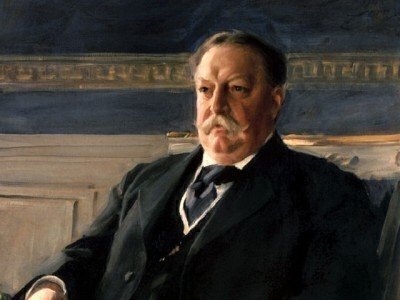Editor’s note: The following is excerpted from a special preview that first appeared in The Atlantic.
 As Donald Trump’s executive orders punishing steel and aluminum imports threaten a trade war around the globe, Republicans on Capitol Hill are debating whether to reassert Congress’s ultimate constitutional authority over tariffs and trade. This isn’t the first time the GOP has split itself in two on the question of protective tariffs. But the last time, just over 100 years ago, the Republican president’s policies were the exact opposite of Trump’s.
As Donald Trump’s executive orders punishing steel and aluminum imports threaten a trade war around the globe, Republicans on Capitol Hill are debating whether to reassert Congress’s ultimate constitutional authority over tariffs and trade. This isn’t the first time the GOP has split itself in two on the question of protective tariffs. But the last time, just over 100 years ago, the Republican president’s policies were the exact opposite of Trump’s.
William Howard Taft—in his opposition to populism and protectionism, as well as his devotion to constitutional limits on the powers of the presidency—was essentially the anti-Trump. Unlike the current president, and his own predecessor, Theodore Roosevelt, Taft refused to rule by executive order, insisting that the chief executive could only exercise those powers that the Constitution explicitly authorizes.
This posture was especially clear on matters of trade. Acknowledging that Congress, not the president, has the power to “lay and collect Taxes, Duties, Imposts and Excises,” Taft persuaded lawmakers to pass one of his core campaign goals: lower tariffs (although not as low as he hoped).
It’s still too early to say how much, if any, political fallout Trump’s diversion from current GOP orthodoxy over trade will cause. In Taft’s day, his moderate changes to trade policy ended up dividing the party, and ultimately guaranteed the election of an internationalist Democrat, Woodrow Wilson. But Taft could still claim victory in the long run: Because his trade agenda was enacted by Congress, not by executive fiat, it outlived his presidency. Even more significantly, it established a relatively consistent bipartisan commitment to free trade that persisted for more than a century—until Trump shattered it earlier this month.
Taft’s central promise in the campaign of 1908 was to call Congress into a special session to lower tariffs. Through much of the 19th century, the Republican Party had been committed to moderate protective tariffs on foreign imports to allow U.S. manufacturers to undersell their foreign competitors. But by the time Taft ran for office, that consensus had broken down, and the GOP was immersed in an internecine debate on whether tariffs should be high or low.
To read the full excerpt on The Atlantic, go to: https://www.theatlantic.com/politics/archive/2018/03/trump-william-taft/555656/?utm_source=atltw
For more information on William Howard Taft by National Constitution Center President and CEO Jeffrey Rosen, go to http://americanpresidentsseries.com/williamhowardtaft.asp.







